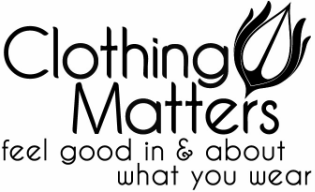Can Americans reduce their contributions to the significant environmental impact that apparel production has on our planet?
We're encouraged to see that the dirty business of "what we wear' and the facts behind fashion/apparel being the 2nd most polluting industry in the world is finally getting attention in mainstream. Thanks Newsweek!
For those of us fortunate enough to live in a state surrounded by the Great Lakes we love so dearly, it's important to recognize that apparel production is also the 2nd largest polluter of water after agriculture--(what we eat!)
Most people forget, when making purchases, that we live in a closed ecosystem impacted by our choices. The things we buy and dispose of are full of substances--many toxic and persistant,--that compromise our personal, social and ecological well being.
If you care to know what's in the clothing you choose to put on your precious body (or those of your loved ones) , check out our Critical Reading & Critical Viewing tabs for some of the most compelling information we've seen.
In Newsweek's recent article "Toxic Fashion--The Environmental Disaster in Your Closet", Pamela Ellsworth, chairperson of Fashion Institute of Technology's Global Fashion Management Program and supply chain expert says that "core to the problem is that people in the US expect low prices...We are going to have to train consumers in the US to pay more for clothing. It can't be the only commodity that gets cheaper every year."
We're encouraged to see that the dirty business of "what we wear' and the facts behind fashion/apparel being the 2nd most polluting industry in the world is finally getting attention in mainstream. Thanks Newsweek!
For those of us fortunate enough to live in a state surrounded by the Great Lakes we love so dearly, it's important to recognize that apparel production is also the 2nd largest polluter of water after agriculture--(what we eat!)
Most people forget, when making purchases, that we live in a closed ecosystem impacted by our choices. The things we buy and dispose of are full of substances--many toxic and persistant,--that compromise our personal, social and ecological well being.
If you care to know what's in the clothing you choose to put on your precious body (or those of your loved ones) , check out our Critical Reading & Critical Viewing tabs for some of the most compelling information we've seen.
In Newsweek's recent article "Toxic Fashion--The Environmental Disaster in Your Closet", Pamela Ellsworth, chairperson of Fashion Institute of Technology's Global Fashion Management Program and supply chain expert says that "core to the problem is that people in the US expect low prices...We are going to have to train consumers in the US to pay more for clothing. It can't be the only commodity that gets cheaper every year."

 RSS Feed
RSS Feed